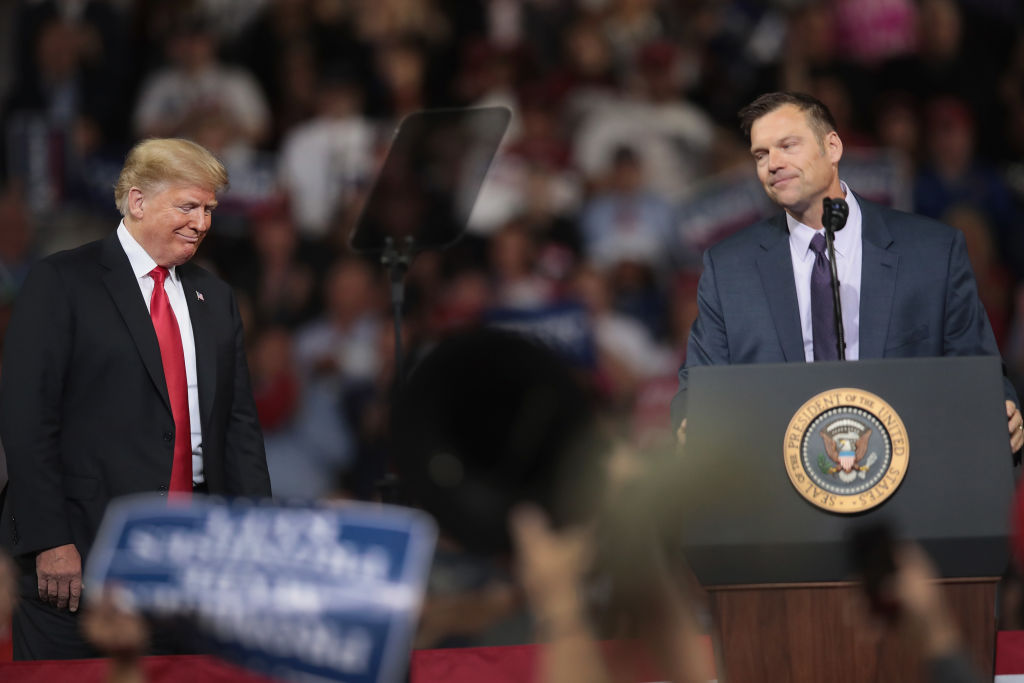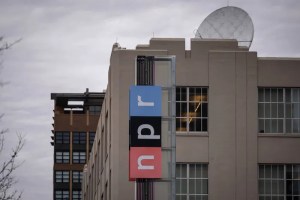Donald Trump celebrated the confirmation of the second Supreme Court justice of his presidency at the Kansas Expocentre in Topeka on Saturday evening, in a typically boisterous rally meant to boost Republicans running in the state.
But all is not well in the land of Oz. Kansas, thought to be a deep-red state which went for Trump in 2016 by more than 20 per cent, nonetheless is posing problems for GOP candidates running in November.
The legacy of former governor Sam Brownback, one of the least popular governors in the nation, may be having an impact on the race, despite having left office in January to become Trump’s Ambassador-at-Large for International Religious Freedom. In effect, the challenge for Democrats is to persuade moderate Republicans that their candidates are suitably moderate that voting to punish their party doesn’t pose too much of a risk.
‘Kansas state Democrats find themselves in an odd position,’ says Russell Fox, a political science professor at Friends University in Wichita and a keen observer of Kansas politics, ‘being forced by both the liberalising of their own small base, and by the explicit, and very un-Kansas-like, extremist posturing of the leader of the opposition, to move further to the left than the general political character of the state as a whole would seem to support.’
Running for governor on the GOP ticket is Kris Kobach, a populist very closely tied to Trump, who currently serves as Kansas Secretary of State. Despite his Trumpian populist views on virtually everything, Kobach has an impressive educational pedigree, with an Oxford PhD and Yale law degree, and is widely believed to have higher political ambitions. But he only barely skated by to victory in the primary, and 40 per cent of Republicans in the statehouse won’t admit to supporting him.
There was much speculation about Trump joining the administration in some capacity, and Cockburn reported that he was actually offered the position of DHS secretary, though it was blocked by Sens. Lindsey Graham and John McCain. Kobach has tried to nationalise the election, in part because the legacy of his predecessor is so unpopular.
Further down the ballot, for those unfamiliar with the state, there are four congressional seats, two of which, the Second and Third districts, are at least somewhat competitive. In 2016, Hillary Clinton won only two counties in Kansas, one of which lies in each of those two competitive congressional districts. The Third is comprised of suburbs of Kansas City, Johnson County, a relatively wealthy suburb similar to, say, Fairfax County or parts of Atlanta or Connecticut; and Wyandotte County, which contains the parts of Kansas City West of the Missouri River and a substantial black population.
Running in this district is the incumbent Republican Kevin Yoder, who is closely tied to House leadership. He made news last week when it was revealed that the National Republican Congressional Committee had cancelled a $1 million ad buy on his behalf, leading to headlines speculating that the national GOP was cutting him loose.
His opponent, Sharice Davids, is a charismatic candidate with a background in community development. She is personally much more compelling than Yoder, as a Native American lesbian MMA fighter. At least once Yoder lied about Davids’s background, portraying the native Kansan as a Pelosi satrap sent from Washington. But she is somewhat of a political unknown, having never held elective office, and has badly mishandled a number of issues, first saying she would abolish ICE, then that she wouldn’t. Videos on her YouTube channel suggest she wants to run Christian adoption agencies out of business.
The Second District contains an Eastern slice of the state from Nebraska to Oklahoma containing Topeka, Leavenworth, and Lawrence. The latter lies in Douglas County, one of the two that voted for Hillary in 2016. Here, Republican Steve Watkins is running against Paul Davis, who served six years as minority leader in the Kansas House, to fill an open seat now occupied by Republican Lynn Jenkins.
Having followed the Republican primary in this district somewhat closely, because I live here, a few observations stood out. One is that, for all its reputation as a deep-red state, Kansas conservatives are not very well organised. The comparison with Republicans in my home state of Virginia could not be more stark.
If, for example, it came out that a candidate in a Virginia Republican primary had initially approached the Democrats about running on their ticket and claimed to be pro-choice, then switched sides, and was married to a Planned Parenthood award recipient, and that his rich father was buying millions of dollars’ worth of ads for him, a healthy network of blogs, listservs, and phone trees would get the word out that this man is not to be trusted.
By contrast, here in Kansas, Steve Watkins sailed to victory despite all those drawbacks. My sense is many voters simply weren’t aware of it.
Nevertheless, Trump’s endorsement on Saturday might help to mitigate conservative lack of enthusiasm for Watkins.
‘We remain at the precipice and it is vital that we defeat the likes of Davis and Kelly,’ said Steve Fitzgerald, a state senator who ran against Watkins in the primary. ‘These races could go wrong and now, implausibly, Yoder’s is said to be in question. Republican turnout will be the key factor.’
Overall it does not appear Kansas is becoming another North Carolina, but it is also not insulated from some of the broader national trends: enthusiastic Democrats, backlash to Trump, and so forth.


















